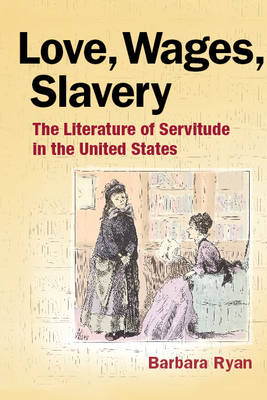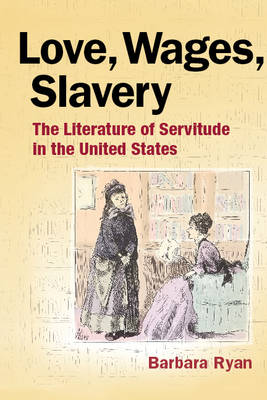
Vous voulez être sûr que vos cadeaux seront sous le sapin de Noël à temps? Nos magasins vous accueillent à bras ouverts. La plupart de nos magasins sont ouverts également les dimanches, vous pouvez vérifier les heures d'ouvertures sur notre site.
- Retrait gratuit dans votre magasin Club
- 7.000.000 titres dans notre catalogue
- Payer en toute sécurité
- Toujours un magasin près de chez vous
Vous voulez être sûr que vos cadeaux seront sous le sapin de Noël à temps? Nos magasins vous accueillent à bras ouverts. La plupart de nos magasins sont ouverts également les dimanches, vous pouvez vérifier les heures d'ouvertures sur notre site.
- Retrait gratuit dans votre magasin Club
- 7.000.0000 titres dans notre catalogue
- Payer en toute sécurité
- Toujours un magasin près de chez vous
Love, Wages, Slavery
The Literature of Servitude in the United States
Barbara Ryan
Livre broché | Anglais
30,95 €
+ 61 points
Description
As slavery tore at the nation in the nineteenth century, the role of servants and slaves within the family became a heated topic, and publishers produced a steady stream of literature instructing households how to hire, treat, and discipline servants. In this book, Barbara Ryan surveys an expansive collection of these published materials from both before and after Emancipation to chart shifts in thinking about what made a good servant and how servants felt about serving non-kin, as well as changing ideas about gender, free and unfree labor, status, race, domesticity, and family life.
Paying particular attention to women servants, Ryan traces the "servant problem" as it was represented in magazines like the Atlantic Monthly, Godey's Lady's Book, and Harper's Bazar. Her wide-ranging probe also culls commentary from advice literature, letters and diaries, pro- and anti-slavery propaganda, sentimental fiction, and memoirs of communitarian reform to reveal the fundamental uncertainty about what it meant for some servants to be "free" while others remained fettered to their posts.
Spécifications
Parties prenantes
- Auteur(s) :
- Editeur:
Contenu
- Nombre de pages :
- 256
- Langue:
- Anglais
Caractéristiques
- EAN:
- 9780252077753
- Date de parution :
- 30-09-10
- Format:
- Livre broché
- Format numérique:
- Trade paperback (VS)
- Dimensions :
- 140 mm x 221 mm
- Poids :
- 376 g







